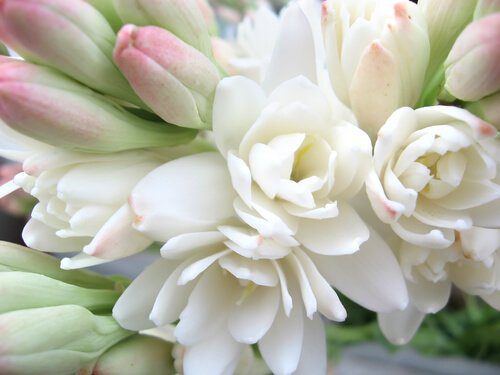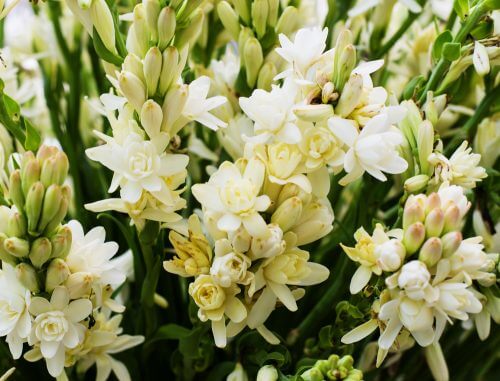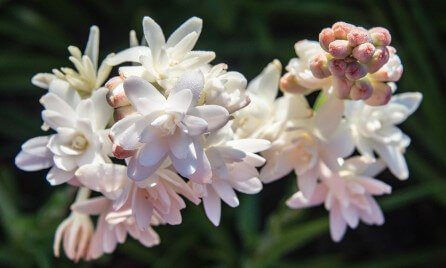Tuberose: The Secret Scent to Elevate Your Bouquet and Garden
Those dainty Victorians considered the rich, heady scent of a tuberose to signify dangerous love and voluptuousness. It must have put them into a swoon. In fact, they forbade young ladies from smelling it, for fear it would make them have an orgasm.
Of course we’re talking about the English Victorians (are there really any other kind).

The French of course were growing tuberose near in Grasse, and harvesting it, then bundling the flowers, which bloom in full sun late in the year into parfumeries where their oils were extracted and blended with other scents. The results were perfumes like Guerlain’s Jardin des Bagatelles, Chloe by Karl Lagerfeld, Amarige by Givenchy and according to the knowledgeable fragrantica best of all Fracas by Robert Piguet.
The scent can be overwhelming, and the flowers, strung together into a lei, can perfume an entire room.
A stalk of tuberose is high-end florists’ secret weapon in a giant arrangement of hydrangeas, or dahlias, or zinnias, or gerbera daisies- flowers that offer a burst of excitement, but no scent.

And the tuberose can offer the same thing in your late garden. Isn’t it a shame that most of the flowers with lovely scents come early in the years? The lilacs, peonies, even tulips have a scent. We want to bury ourselves in the roses, and some of the floribundas keep on going. The best of them keep up with their scents.
But most of the rest of the flower garden is scentless, except to the bees and the butterflies. Except for the tuberose.
If you have a sunny front door, plant a tuberose bulb next to it. Anyone coming to the door will be overwhelmed by the haunting scent. If not overpowered.
It’s like having a room air freshener for the entire outdoors. Tuberose bloom from the bottom up, and it takes the spike – which the French thought looked like a tube – a long time to bloom. The tuberose is not exactly a knockout flower until you get really close. The flowers are small. Very small. And the spikes are not very tall. These photos are larger than life. It’s the scent, not the looks you are after.
Then put another bulb – ok, scientifically speaking they are rhizomes – near a bedroom window because they actually like to open up at night. (Mind you, they don’t close up during the day.) But keep in mind: full sun.

And then another one out in the yard, a sunny spot to greet you on the way to a chore. And then, why not, one at the mailbox. Let the main-delivery-person – what do we call them these days? – have a thrill.
You might as well get six rhizomes. I got mine from Gurneys Seed & Nursery Company, and the six plump rhizomes arrived in the mail (with one extra) with labels from Ohio and Oregon and Washington, saying it passed all kinds of agricultural standards.
It’s not too late. Then, when you make a bouquet for a friend, and it’s full of zinnias and dahlias and those small sunflowers that look so cheerful, tuck in a tuberose.
Everyone smiles when they get a bouquet, and then they can’t help themselves. They dip their head down and smell it.
Make your friend swoon. Guaranteed.
